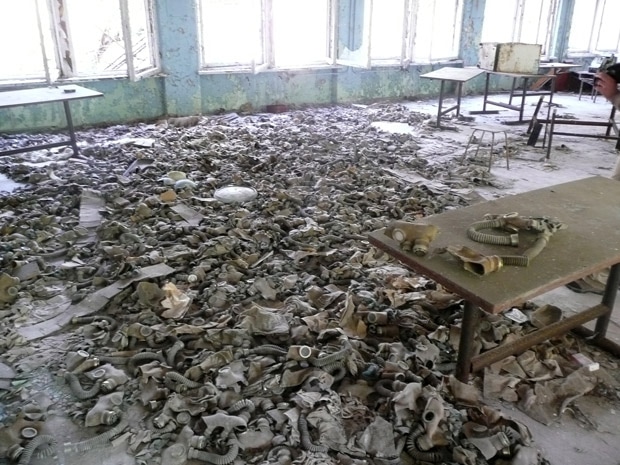|
‘Neighbours’ by Gillian Clarke
Around the time of our Year 7 trip to the Scott Polar Research Institute, I asked my Year 8 pupils to write about another place that I could be fairly confident none of them had visited: namely, Chernobyl, together with its ghost city of Pripyat. Abandoned in the space of two days following the catastrophic meltdown of the city’s nearby nuclear power station in 1986, Pripyat now exists essentially as a virtual entity on the internet: access to its physical remains is still strictly restricted due to continued contamination from nuclear fallout. Pretty much unseen by the rest of the world during the first decade of its post-apocalyptic sleep, Pripyat now lives again for anyone who cares to look via satellite images taken from Google Earth, Youtube documentaries and countless haunting photo montages. The children were encouraged to conduct their own researches into the story of Chernobyl and Pripyat, referring to these and other sources. It intrigued them that this event, which so profoundly affected the previous generation, was something about which they had heard little, if anything, in spite of the increasing wealth of information about it to be found within seconds on the internet. Simply telling them to ‘Google’ the word ‘Chernobyl’ is all that was required to open up a world and a story which these children could scarcely believe to be true. We also looked at Gillian Clarke’s response to the disaster in her poem ‘Neighbours’ asking the question: ‘Do you need to go to a place to be able to write about it?’ The overwhelming answer was no. The children felt that what we know about a place was just as important as knowing the place at first hand. This conclusion gave them the confidence to write about Chernobyl themselves: Chernobyl You are alone The dust has long been gathered Your houses are silent, abandoned No life lives between your lifeless arms No one plays, laughs, cries upon your back You lie there, your heart rusting Cracking under the heavy air Meddlesome moss crawling upon shrunken shoes. The houses are fragile like thin glass Your earth sprouts rare greenery To wither and fall once again. Emily (aged 12) John Betjeman Poetry Competition 2013 - Highly Commended Chernobyl Tranquil as a cyclone, the explosion of a town Hushed up by a country in search of renown Transparent fire lights up the sky Invisible to the human eye As songbirds fell from an invisible hand That dropped them on an unsuspecting land And the first sign of the coming storm Was the loud silence in the light of morn And the thunder came on a normal day When children went out in the rain to play. Lucy (aged 13) What helps to make these two poems particularly moving is the way in which the writers have tapped into what they can relate to, within the context of something beyond their personal experience. Although they may never have been to the place in question and have never experienced the terror of dealing with the aftermath of a nuclear catastrophe, they have been able to focus in on the familiar within the sources that we studied. Photos of children’s shoes overgrown with moss, limbless dolls, rusted school desks and derelict swimming pools helped the writers to imagine what their own world would be like in the event of a similar disaster. Their images of a recognizable world transformed into a nightmare carry a universal weight. Their writing says: “This could happen again, anywhere, to anyone. What if it happened here, to me?” Children are particularly good at using this thought experiment, whatever the source or inspiration and their ability to empathise is often, as here, particularly striking.
0 Comments
|
AuthorSixteen years of teaching poetry to children have furnished me with a wealth of ideas. Do dip in and adapt any of these for your own lessons. Archives
April 2020
Categories
All
|


 RSS Feed
RSS Feed
